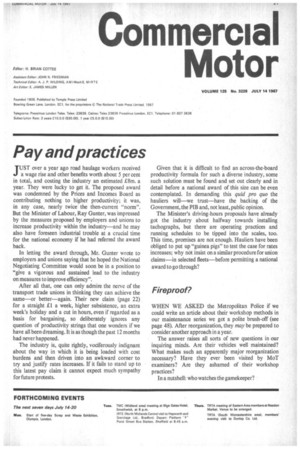Pay and practices
Page 23

If you've noticed an error in this article please click here to report it so we can fix it.
JUST over a year ago road haulage workers received a wage rise and other benefits worth about 5 per cent in total, and costing the industry an estimated £8m. a year. They were lucky to get it. The proposed award was condemned by the Prices and Incomes Board as contributing nothing to higher productivity; it was, in any case, nearly twice the then-current "norm". But the Minister of Labour, Ray Gunter, was impressed by the measures proposed by employers and unions to increase productivity within the industry—and he may also have foreseen industrial trouble at a crucial time for the national economy if he had referred the award back.
In letting the award through, Mr. Gunter wrote to employers and unions saying that he hoped the National Negotiating Committee would soon be in a position to "give a vigorous and sustained lead to the industry on measures to improve efficiency".
After all that, one can only admire the nerve of the transport trade unions in thinking they can achieve the same—or better—again. Their new claim (page 22) for a straight £1 a week, higher subsistence, an extra week's holiday and a cut in hours, even if regarded as a basis for bargaining, so deliberately ignores any question of productivity strings that one wonders if we have all been dreaming. It is as though the past 12 months had never happened.
The industry is, quite rightly, vociferously indignant about the way in which it is being loaded with cost burdens and then driven into an awkward corner to try and justify rates increases. If it fails to stand up to this latest pay claim it cannot expect much sympathy for future protests. Given that it is difficult to find an across-the-board productivity formula for such a diverse industry, some such solution must be found and set out clearly and in detail before a national award of this size can be even contemplated. In demanding this quid pro quo the hauliers will—we trust—have the backing of the Government, the PIB and, not least, public opinion.
The Minister's driving-hours proposals have already got the industry about halfway towards installing tachographs, but there are operating practices and running schedules to be tipped into the scales, too. This time, promises are not enough. Hauliers have been obliged to put up "guinea pigs" to test the case for rates increases; why not insist on a similar procedure for union claims—in selected fleets—before permitting a national award to go through?
Fireproof?
WHEN WE ASKED the Metropolitan Police if we could write an article about their workshop methods in our maintenance series we got a polite brush-off (see page 48). After reorganization, they may be prepared to consider another approach in a year.
The answer raises all sorts of new questions in our inquiring minds. Are their vehicles well maintained? What makes such an apparently major reorganization necessary? Have they ever been visited by MoT examiners? Are they ashamed of their workshop practices?
In a nutshell: who watches the gamekeeper?


























































































































